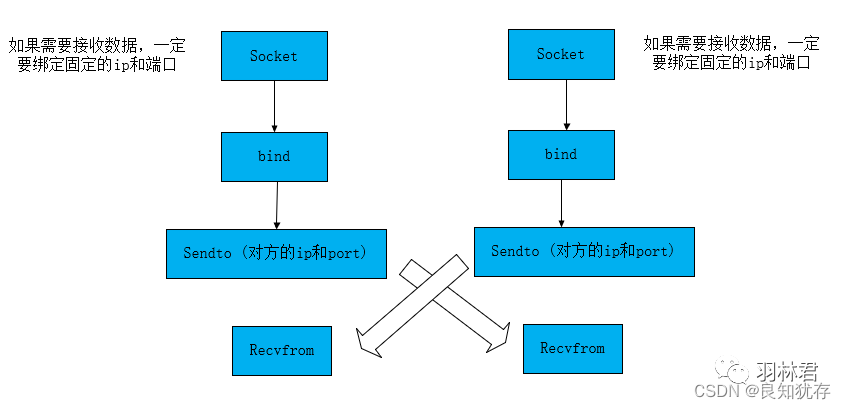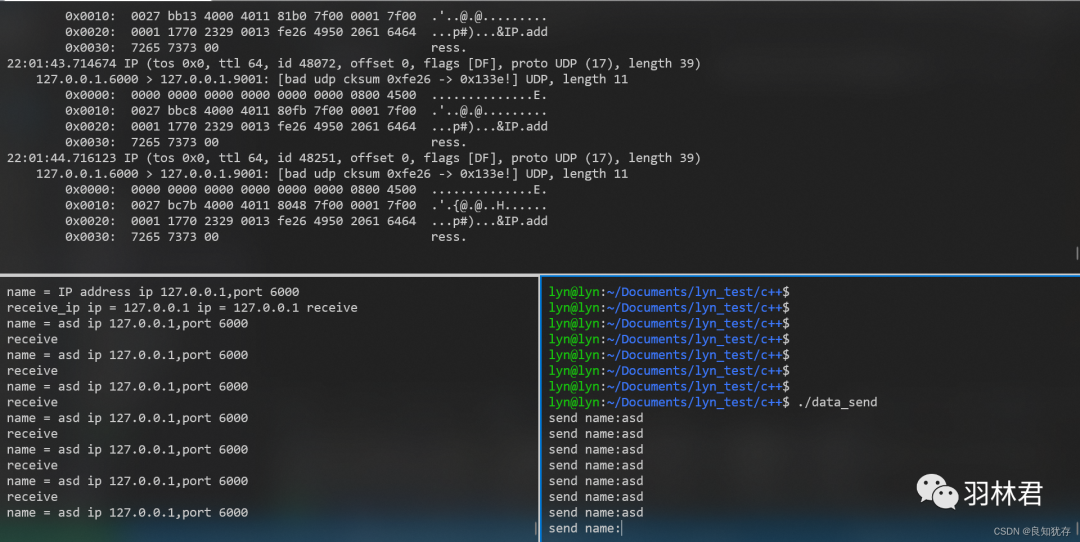一種通過Udp進行無確認Ip的雙向的通信

一種通過Udp進行無確認Ip的雙向的通信
前言
udp是一種不可靠的通信,但是有些時候還是會有使用。今天分享一個示例:主體邏輯,一個端口廣播地址,接收到ip地址數據後,其他端口基於這個ip進行bind綁定,最後通信,這樣可以保證我們後續繼續增加端口交互時候不需要關注ip地址綁定的問題。
主要原理介紹
- 低通信頻率端口進行服務端IP信息udp廣播,接收端是不固定IP監聽,監聽主機任意IP地址的特定端口
- 接收到廣播通道的ip地址後,與特定IP、port建立tcp或者udp雙向高頻率通信。
下圖是基於UDP 的Socket 函數調用過程:
只有接收的時候需要bind ip和端口

socket 監聽所有ip 特定端口代碼:
#define PORT 6000
bzero(&adr_inet, sizeof(adr_inet));
adr_inet.sin_family = AF_INET;
adr_inet.sin_addr.s_addr = htonl(INADDR_ANY);
adr_inet.sin_port = htons(port);
ret = bind(cfd, (struct sockaddr *)&addr, sizeof(addr));- 1.
- 2.
- 3.
- 4.
- 5.
- 6.
socket綁定的ip為INADDR_ANY 的說明:
socket INADDR_ANY 監聽0.0.0.0地址socket只綁定端口讓路由表決定傳到哪個ip
其中INADDR_ANY就是指定地址為0.0.0.0的地址,這個地址事實上表示不確定地址,或“所有地址”、“任意地址”。如果指定ip地址為通配地址(INADDR_ANY),那麼內核將等到套接字已連接(TCP)或已在套接字上發出數據報時才選擇一個本地IP地址。一般情況下,如果你要建立網絡服務器,則你要通知服務器操作系統:請在某地址xxx.xxx.xxx.xxx上的某端口yyyy上進行偵聽,並且把偵聽到的數據包發送給我。這個過程,你是通過bind()系統調用完成的。——也就是說,你的程序要綁定服務器的某地址,或者說:把服務器的某地址上的某端口占為已用。服務器操作系統可以給你這個指定的地址,也可以不給你。
如果你的服務器有多個網卡,而你的服務(不管是在udp端口上偵聽,還是在tcp端口上偵聽),出於某種原因:可能是你的服務器操作系統可能隨時增減IP地址,也有可能是為了省去確定服務器上有什麼網絡端口(網卡)的麻煩—— 可以要在調用bind()的時候,告訴操作系統:“我需要在yyyy 端口上偵聽,所以發送到服務器的這個端口,不管是哪個網卡/哪個IP地址接收到的數據,都是我處理的。”這時候,服務器則在0.0.0.0這個地址上進行偵聽。無論連接哪個ip都可以連上的,只要是往這個端口發送的所有ip都能連上。
示例代碼:
data_send.c 在端口9001進行ip地址的udp廣播以及讀取終端數據廣播到7000端口
#include <stdio.h>
#include <stdlib.h>
#include <unistd.h>
#include <string.h>
#include <netinet/in.h>
#include <arpa/inet.h>
#include <sys/socket.h>
#include <sys/types.h>
#include <errno.h>
#include <pthread.h>
#include <signal.h>
#define IP "127.0.0.1"
#define
#define
// gcc data_send.c -o data_send -pthread
int cfd = -1;
//接收线程函数
void *receive(void *pth_arg)
{
int ret = 0;
char name_data[3] = {0};
struct sockaddr_in addr0 = {0};
int addr0_size = sizeof(addr0);
//从对端ip和端口号中接收消息,指定addr0用于存放消息
while (1)
{
bzero(name_data, sizeof(name_data));
ret = recvfrom(cfd, name_data, sizeof(name_data), 0, (struct sockaddr *)&addr0, &addr0_size);
if (-1 == ret)
{
fprintf(stderr, "%d, %s :%s", __LINE__, "recv failed", strerror(errno));
exit(-1);
}
else if (ret > 0)
{
printf("\nname = %s ", name_data); //打印对方的消息和端口号
printf("ip %s,port %d \n", inet_ntoa(addr0.sin_addr), ntohs(addr0.sin_port));
}
}
}
void *data_send(void *pth_arg)
{
int ret = 0;
char data[] = "IP address";
struct sockaddr_in addr0 = {0};
addr0.sin_family = AF_INET; //设置tcp协议族
addr0.sin_port = htons(DATA_PORT); //设置端口号
addr0.sin_addr.s_addr = htonl(INADDR_ANY); //设置ip地址
//发送消息
while (1)
{
ret = sendto(cfd, (void *)data, sizeof(data), 0, (struct sockaddr *)&addr0, sizeof(addr0));
sleep(1);
if (-1 == ret)
{
fprintf(stderr, "%d, %s :%s", __LINE__, "sendto failed", strerror(errno));
exit(-1);
}
}
}
int main()
{
int ret = -1;
//创建tcp/ip协议族,指定通信方式为无链接不可靠的通信
cfd = socket(AF_INET, SOCK_DGRAM, 0);
if (-1 == cfd)
{
fprintf(stderr, "%d, %s :%s", __LINE__, "socket failed", strerror(errno));
exit(-1);
}
//进行端口号和ip的绑定
struct sockaddr_in addr;
addr.sin_family = AF_INET; //设置tcp协议族
addr.sin_port = htons(PORT); //设置端口号
addr.sin_addr.s_addr = inet_addr(IP); //设置ip地址
ret = bind(cfd, (struct sockaddr *)&addr, sizeof(addr));
if (-1 == ret)
{
fprintf(stderr, "%d, %s :%s", __LINE__, "bind failed", strerror(errno));
exit(-1);
}
//创建线程函数,用于处理数据接收
pthread_t id,data_send_id;
ret = pthread_create(&id, NULL, receive, NULL);
if (-1 == ret)
{
fprintf(stderr, "%d, %s :%s", __LINE__, "pthread_create failed", strerror(errno));
exit(-1);
}
// pthread_join(id,NULL);
ret = pthread_create(&data_send_id, NULL, data_send, NULL);
if (-1 == ret)
{
fprintf(stderr, "%d, %s :%s", __LINE__, "pthread_create failed", strerror(errno));
exit(-1);
}
struct sockaddr_in addr0;
addr0.sin_family = AF_INET; //设置tcp协议族
addr0.sin_port = htons(7000); //设置端口号
addr0.sin_addr.s_addr = inet_addr(IP); //设置ip地址
char name_send[3] = {0};
//发送消息
while (1)
{
bzero(name_send, sizeof(name_send));
printf("send name:");
scanf("%s", name_send);
//发送消息时需要绑定对方的ip和端口号
ret = sendto(cfd, (void *)name_send, sizeof(name_send), 0, (struct sockaddr *)&addr0, sizeof(addr0));
if (-1 == ret)
{
fprintf(stderr, "%d, %s :%s", __LINE__, "accept failed", strerror(errno));
exit(-1);
}
}
return 0;
}- 1.
- 2.
- 3.
- 4.
- 5.
- 6.
- 7.
- 8.
- 9.
- 10.
- 11.
- 12.
- 13.
- 14.
- 15.
- 16.
- 17.
- 18.
- 19.
- 20.
- 21.
- 22.
- 23.
- 24.
- 25.
- 26.
- 27.
- 28.
- 29.
- 30.
- 31.
- 32.
- 33.
- 34.
- 35.
- 36.
- 37.
- 38.
- 39.
- 40.
- 41.
- 42.
- 43.
- 44.
- 45.
- 46.
- 47.
- 48.
- 49.
- 50。
- 51.
- 52.
- 53.
- 54.
- 55.
- 56.
- 57.
- 58.
- 59.
- 60.
- 61.
- 62.
- 63.
- 64.
- 65.
- 66.
- 67.
- 68.
- 69.
- 70.
- 71.
- 72.
- 73.
- 74.
- 75.
- 76.
- 77.
- 78.
- 79.
- 80.
- 81.
- 82.
- 83.
- 84.
- 85.
- 86.
- 87.
- 88.
- 89.
- 90.
- 91.
- 92.
- 93.
- 94.
- 95.
- 96.
- 97.
- 98.
- 99.
- 100。
- 101.
- 102.
- 103.
- 104.
- 105.
- 106.
- 107.
- 108.
- 109.
- 110.
- 111.
- 112.
- 113.
- 114.
- 115.
- 116.
- 117.
- 118.
- 119.
- 120.
- 121.
- 122.
- 123.
- 124.
- 125.
- 126.
- 127.
data_process.c 進行端口9001的ip數據的捕獲,當接收到ip數據後,綁定廣播的ip地址進行數據的收發,這裡用的是udp接收大家也可以試試tcp交互。
#include <stdio.h>
#include <stdlib.h>
#include <unistd.h>
#include <string.h>
#include <netinet/in.h>
#include <arpa/inet.h>
#include <sys/socket.h>
#include <sys/types.h>
#include <errno.h>
#include <pthread.h>
#include <signal.h>
#define IP "127.0.0.1"
#define
#define
// typedef uint32_t in_addr_t;
// gcc data_process.c -o data_process -pthread
int cfd = -1,data_fd = -1;
uint32_t receive_ip = -1;
void *receive(void *pth_arg)
{
int ret = 0;
char name_data[3] = {0};
struct sockaddr_in addr0 = {0};
int addr0_size = sizeof(addr0);
while (1)
{
printf("receive:");
bzero(name_data, sizeof(name_data));
ret = recvfrom(cfd, name_data, sizeof(name_data), 0, (struct sockaddr *)&addr0, &addr0_size);
if (-1 == ret)
{
fprintf(stderr, "%d, %s :%s", __LINE__, "recv failed", strerror(errno));
exit(-1);
}
else if (ret > 0)
{
printf("\nname = %s ", name_data);
printf("ip %s,port %d \n", inet_ntoa(addr0.sin_addr), ntohs(addr0.sin_port));
}
}
}
void *data_receive(void *pth_arg)
{
int ret = 0;
char name_data[10] = {0};
struct sockaddr_in addr0 = {0};
int addr0_size = sizeof(addr0);
while (1)
{
bzero(name_data, sizeof(name_data));
ret = recvfrom(data_fd, name_data, sizeof(name_data), 0, (struct sockaddr *)&addr0, &addr0_size);
if (-1 == ret)
{
fprintf(stderr, "%d, %s :%s", __LINE__, "recv failed", strerror(errno));
exit(-1);
}
else if (ret > 0)
{
printf("\nname = %s ", name_data);
printf("ip %s,port %d \n", inet_ntoa(addr0.sin_addr), ntohs(addr0.sin_port));
receive_ip = addr0.sin_addr.s_addr;
char buf[20] = { 0 };
inet_ntop(AF_INET, &receive_ip, buf, sizeof(buf));
printf("receive_ip ip = %s ", buf);
// printf("receive_ip ip = %s ", inet_ntop(receive_ip));
break;
}
}
}
int main()
{
int ret = -1;
data_fd = socket(AF_INET, SOCK_DGRAM, 0);
if (-1 == data_fd)
{
fprintf(stderr, "%d, %s :%s", __LINE__, "socket failed", strerror(errno));
exit(-1);
}
struct sockaddr_in addr;
addr.sin_family = AF_INET; //设置tcp协议族
addr.sin_port = htons(DATA_PORT); //设置端口号
addr.sin_addr.s_addr = inet_addr(IP); //设置ip地址
ret = bind(data_fd, (struct sockaddr *)&addr, sizeof(addr));
if (-1 == ret)
{
fprintf(stderr, "%d, %s :%s", __LINE__, "bind failed", strerror(errno));
exit(-1);
}
pthread_t receive_id;
ret = pthread_create(&receive_id, NULL, data_receive, NULL);
if (-1 == ret)
{
fprintf(stderr, "%d, %s :%s", __LINE__, "pthread_create failed", strerror(errno));
exit(-1);
}
pthread_join(receive_id,NULL);
cfd = socket(AF_INET, SOCK_DGRAM, 0);
if (-1 == cfd)
{
fprintf(stderr, "%d, %s :%s", __LINE__, "socket failed", strerror(errno));
exit(-1);
}
struct sockaddr_in addr1;
addr1.sin_family = AF_INET; //设置tcp协议族
addr1.sin_port = htons(PORT); //设置端口号
addr1.sin_addr.s_addr = receive_ip; //设置ip地址
char buf[20] = { 0 };
inet_ntop(AF_INET, &receive_ip, buf, sizeof(buf));
printf("ip = %s ", buf);
ret = bind(cfd, (struct sockaddr *)&addr1, sizeof(addr1));
if (-1 == ret)
{
fprintf(stderr, "%d, %s :%s", __LINE__, "bind failed", strerror(errno));
exit(-1);
}
pthread_t id;
ret = pthread_create(&id, NULL, receive, NULL);
if (-1 == ret)
{
fprintf(stderr, "%d, %s :%s", __LINE__, "pthread_create failed", strerror(errno));
exit(-1);
}
pthread_join(id,NULL);
struct sockaddr_in addr0;
addr0.sin_family = AF_INET; //设置tcp协议族
addr0.sin_port = htons(6000); //设置端口号
addr0.sin_addr.s_addr = inet_addr(IP); //设置ip地址
char name_send[3] = {0};
while (1)
{
bzero(name_send, sizeof(name_send));
printf("send name:");
scanf("%s", name_send);
ret = sendto(cfd, (void *)name_send, sizeof(name_send), 0, (struct sockaddr *)&addr0, sizeof(addr0));
if (-1 == ret)
{
fprintf(stderr, "%d, %s :%s", __LINE__, "accept failed", strerror(errno));
exit(-1);
}
}
return 0;
}- 1.
- 2.
- 3.
- 4.
- 5.
- 6.
- 7.
- 8.
- 9.
- 10.
- 11.
- 12.
- 13.
- 14.
- 15.
- 16.
- 17.
- 18.
- 19.
- 20.
- 21.
- 22.
- 23.
- 24.
- 25.
- 26.
- 27.
- 28.
- 29.
- 30.
- 31.
- 32.
- 33.
- 34.
- 35.
- 36.
- 37.
- 38.
- 39.
- 40.
- 41.
- 42.
- 43.
- 44.
- 45.
- 46.
- 47.
- 48.
- 49.
- 50。
- 51.
- 52.
- 53.
- 54.
- 55.
- 56.
- 57.
- 58.
- 59.
- 60.
- 61.
- 62.
- 63.
- 64.
- 65.
- 66.
- 67.
- 68.
- 69.
- 70.
- 71.
- 72.
- 73.
- 74.
- 75.
- 76.
- 77.
- 78.
- 79.
- 80.
- 81.
- 82.
- 83.
- 84.
- 85.
- 86.
- 87.
- 88.
- 89.
- 90.
- 91.
- 92.
- 93.
- 94.
- 95.
- 96.
- 97.
- 98.
- 99.
- 100。
- 101.
- 102.
- 103.
- 104.
- 105.
- 106.
- 107.
- 108.
- 109.
- 110.
- 111.
- 112.
- 113.
- 114.
- 115.
- 116.
- 117.
- 118.
- 119.
- 120.
- 121.
- 122.
- 123.
- 124.
- 125.
- 126.
- 127.
- 128.
- 129.
- 130.
- 131.
- 132.
- 133.
- 134.
- 135.
- 136.
- 137.
- 138.
- 139.
- 140.
- 141.
- 142.
- 143.
- 144.
- 145.
- 146.
- 147.
- 148.
- 149.
- 150。
- 151.
- 152.
一個終端捕獲數據,sudo tcpdump -i lo portrange 5000-8000 -vv -XX -nn,另外兩個終端進行數據交互

結語
這就是我自己的一些udp設計思路的分享。如果大家有更好的想法和需求,也歡迎大家加我好友交流分享哈。
作者:良知猶存,白天努力工作,晚上原創公號號主。公眾號內容除了技術還有些人生感悟,一個認真輸出內容的職場老司機,也是一個技術之外豐富生活的人,攝影、音樂and 籃球。